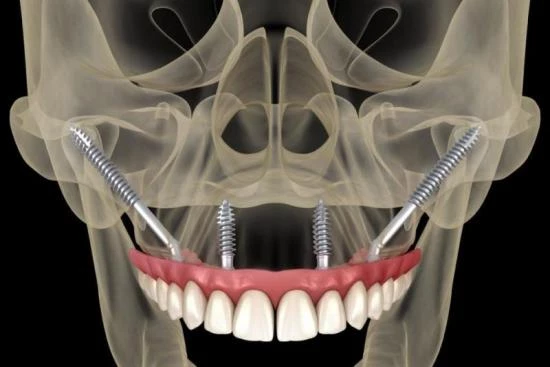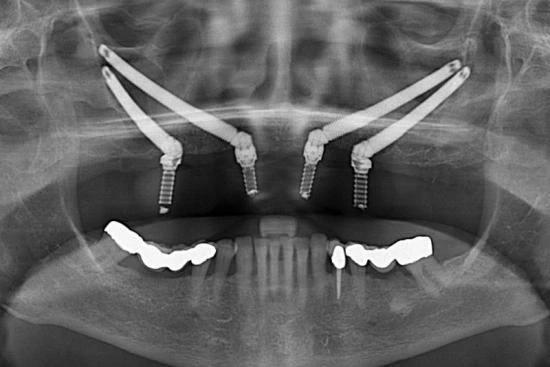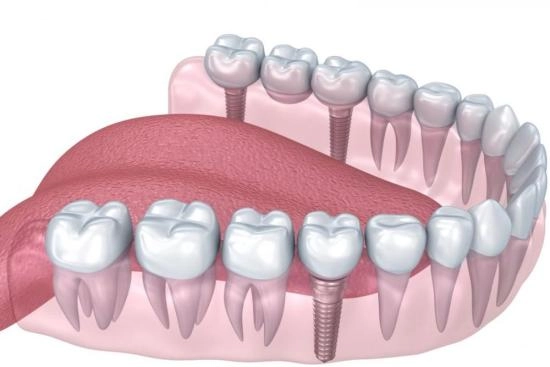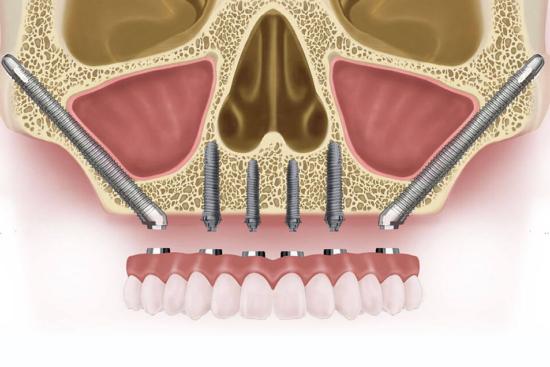Restore a full smile with Zygomatic Implants in Turkey!
This innovative dental implant technique offers a permanent solution for patients with severe bone loss in the upper jaw that makes conventional implants or bone grafting impossible.
Whether you're facing partial or complete edentulism, zygomatic implants can restore an aesthetic and functional smile in a single procedure.
- People with severe bone loss in the maxillary region
- People with partial or complete edentulism
- People who are not eligible for a conventional dental implant
- Implant site infection
- Pain and swelling
- Hematoma and bruising
- Nerve damage
- Bone grafting
- Removable prosthesis
- Between 2 and 4 hours
- Between 2 and 6 months
- Between 90 and 95%
Zygomatic implants cost in Turkey
The price of zygomatic implants in Turkey can vary depending on a number of factors such as the clinic chosen, the surgeon and the complexity of the patient's case.
In general, the average cost of zygomatic implants in Turkey can vary between 2,000 and 4,000 Euros.
Best Clinics with Verified Reviews

- Renowned specialty dental clinic
- 12 examination rooms
- 26 specialized dentists on an area of 2,000 m2

- Specialised dental clinics in Istanbul
- 40 examination rooms
- 60 dentists in total area of 4.000 m2
What is a zygomatic implant?
When the maxillary (upper jaw) bone is insufficient to accommodate traditional dental implants, zygomatic implants offer an effective, long-lasting alternative.
Unlike conventional implants, zygomatic implants are longer and anchored in the zygomatic bone, the strong bone below the eye socket often used in facial surgery.
These titanium implants, inserted directly into the zygomatic bone, provide a solid base for the attachment of a dental prosthesis, eliminating the need for prior bone grafting.

Indications for zygomatic implants
Do you suffer from total edentulism in the upper jaw and can no longer tolerate removable dentures?
Zygomatic implants could be the solution for you! This revolutionary implant technique offers a stable, long-lasting alternative for patients with significant bone resorption in the upper jaw.
Zygomatic implants are indicated for:
- Total edentulism in the maxilla.
- Significant bone resorption in the upper jaw.
- Intolerance to removable dentures.
- Desire for immediate loading of dental implants.
- Refusal or contraindication to bone grafting.
If you meet these criteria, please contact one of our implant dentists to learn more about the procedure.

Zygoma implant process in Turkey
When considering zygomatic implants in Turkey, our qualified surgeons prioritize a thorough examination of the oral cavity, including 3D x-rays. This comprehensive approach allows us to assess jawbone mass and determine the feasibility of bone grafting or the need for zygomatic implants.
The complex placement of zygomatic implants involves the precise placement of longer titanium implants at a steeper angle. This ensures secure anchorage in the maxillary bone of the cheekbone without disturbing the sinuses. Patients benefit from immediate attachment of a temporary denture to the implants and wake up the same day with a new set of teeth.
To minimize discomfort, we offer intravenous sedation followed by local or general anesthesia. Post-operative care is essential to monitor healing and ensure smooth integration of the implants into the bone.

Advantages of the surgery
Zygomatic implants are becoming increasingly popular in the world of oral and maxillofacial surgery. This technique is favored by specialists because of its many advantages:
- Zygomatic implants allow immediate placement of dentures.
- It's a less invasive procedure that does not require bone grafting.
- Lower cost than bone grafting.
- Long-lasting, esthetic results.
- Higher success rate than conventional implants.
Contraindications of jawbone implants
Although zygoma implants are considered an advanced solution for patients with severe bone loss in the upper jaw region, however, it may include some contraindications:
- Infections: Patients with oral or dental infections should be treated before a zygomatic implant is placed. An infection can affect the healing of the implant and even lead to its failure.
- Insufficient cheekbone: Zygomatic implants require sufficient bone volume in the zygomatic region. If the cheekbone is insufficient, it may be necessary to perform a bone graft before implant placement.
- Bone diseases: Patients with bone diseases such as osteoporosis or Paget's disease may have reduced bone density, which may impact the success of the zygomatic implant.
- Radiation therapy: Patients who have undergone radiation therapy to the maxillofacial region may have altered bone quality, which can compromise the success of the implant.
Each patient must discuss their complete medical history with their dentist before undergoing implant surgery to determine if the zygomatic implant is a viable option for them.
Share this page






